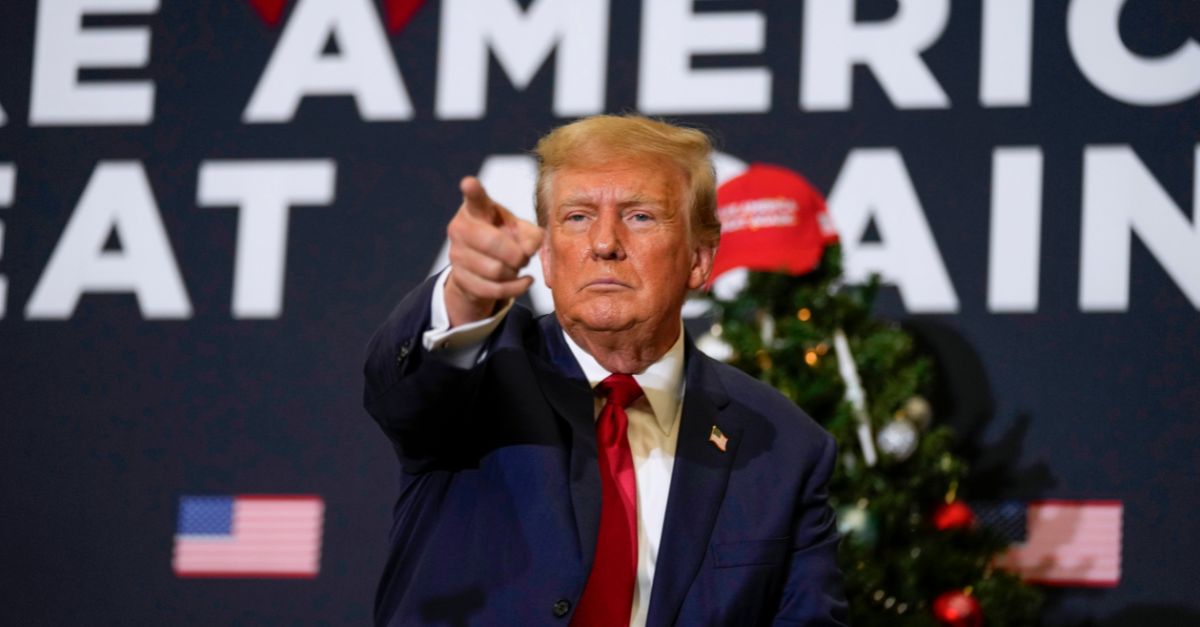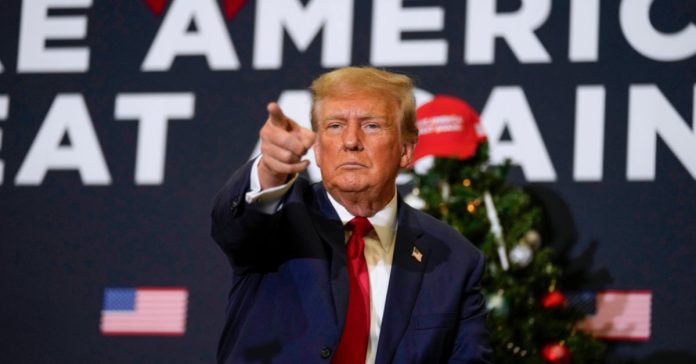
Former President Donald Trump points to supporters during a rally on Dec. 19, 2023, in Waterloo, Iowa. (AP Photo/Charlie Neibergall, File)
The U.S. Supreme Court on Friday agreed to hear former President Donald Trump’s appeal of the Colorado Supreme Court ruling that removed him from the state’s 2024 presidential primary ballot.
In late December, the Mile High State’s highest court ruled the 45th president’s actions on Jan. 6, 2021, at the U.S. Capitol, precluded him from running for president under Section Three of the Fourteenth Amendment to the U.S. Constitution, which bars candidates who have engaged in insurrection or rebellion from holding federal office.
In his Thursday petition to the high court, Trump argued that, despite what occurred on Jan. 6, he in no way “engaged” in “insurrection.”
The nine justices set schedules in the case on an expedited timeline: oral arguments will be held on Thursday, Feb. 8.
A similarly aggressive briefing schedule was attached to the typically terse order granting consideration of Trump’s petition.
“Petitioner’s brief on the merits, and any amicus curiae briefs in support or in support of neither party, are to be filed on or before Thursday, January 18, 2024,” the docket reads. “Respondents’ briefs on the merits, and any amicus curiae briefs in support, are to be filed on or before Wednesday, January 31, 2024. The reply brief, if any, is to be filed on or before 5 p.m., Monday, February 5, 2024.”
By Friday afternoon, two amicus briefs had already been filed: one brief was filed by the Republican National Committee and National Republican Congressional Committee; the other brief was filed by a coalition of attorneys general representing elected GOP politicians in 27 states, led by Indiana and West Virginia, and the Arizona legislature.
The fast-tracked showdown is set to decide one of the weightiest issues facing the nation. Trump is the leading contender, by far, for the GOP presidential nomination and is well-positioned, in terms of popular support measured by various recent opinion polls, to emerge victorious in a likely rematch with President Joe Biden.
Colorado, however, would likely not be considered a must-win state for Trump to recapture the White House — but the precedent set by the Mile High State could dash the 45th president’s hopes of even appearing on the ballot in states that he absolutely would need to win.
The ex-president will soon go toe-to-toe with the lead plaintiff, a former GOP state legislator, in the lawsuit to kick him off the Colorado Republican primary ballot. That contest is currently slated to occur on March 5.
In its landmark Dec. 19, 2023, ruling, the Colorado Supreme Court ruled 4-3 to exclude Trump on the basis that he was an officer of the United States at the time of the riot at the U.S. Capitol Complex. A lower court had previously found that Trump committed insurrection — but declined to rule on whether or not he was an officer, which is a textual requirement of the ban on insurrectionist federal candidates.
Trump’s attorneys reprised that dispute in the petition, arguing Section Three simply does not apply to the U.S. presidency.
“It does not list the presidency,” the filing goes on — referring to the section at issue. “Moreover, it lists offices in descending order, beginning with the highest federal officers and progressing to the catchall term ‘any office, civil or military, under the United States.’ Thus, to find that section 3 includes the presidency, one must conclude that the drafters decided to bury the most visible and prominent national office in a catchall term that includes low ranking military officers, while choosing to explicitly reference presidential electors. This reading defies common sense and is not correct.”
Law&Crime reached out to Trump’s lead attorney in the case, David Alan Warrington, for comment on the Supreme Court’s quick acceptance of their petition, but no response was immediately forthcoming. Similar requests to the other parties’ lead counsel also went unreturned.
The case is stylized as Donald J. Trump v. Norma Anderson. The questions presented in the case have yet to be established.
Have a tip we should know? [email protected]

